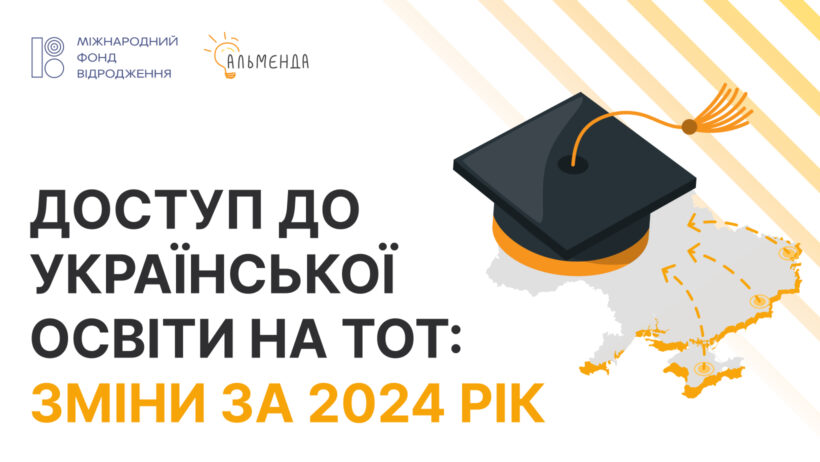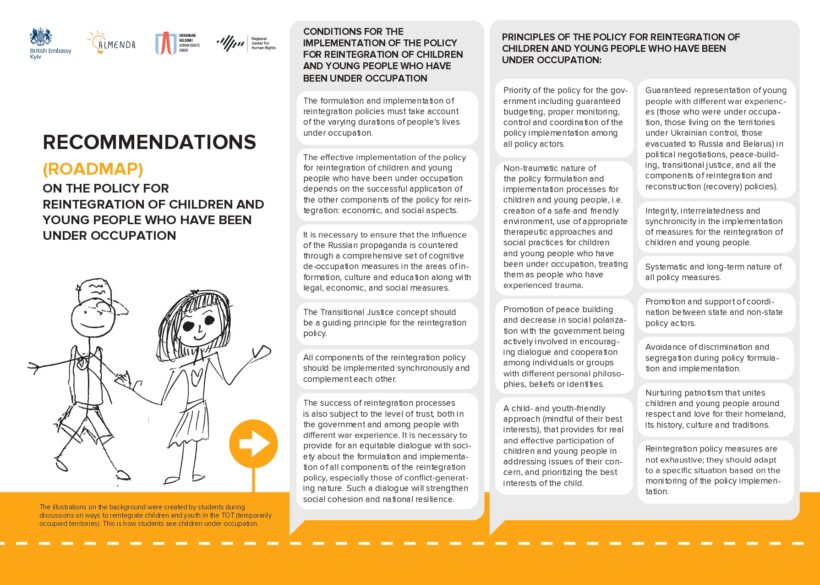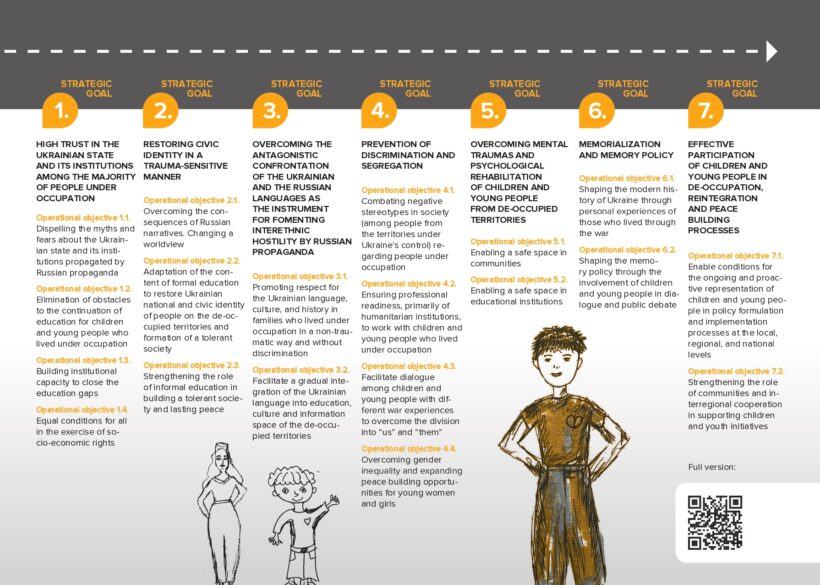

What Changes in Access to Ukrainian Education for Individuals in Temporarily Occupied Territories Occurred in 2024?
With the occupation of parts of its territory in 2014, Ukraine faced new challenges related to ensuring the right to education for individuals living under occupation. These challenges, linked in part to the security situation in the temporarily occupied territories (hereinafter referred to as TOT), only escalated further after 2022.
Article 53 of the Constitution of Ukraine stipulates that everyone has the right to education. The state ensures accessibility and free provision of education. The Constitution of Ukraine also declares that complete general secondary education is compulsory.
According to Article 3 of the Law of Ukraine “On Education”, everyone has the right to quality and accessible education. The right to education includes the right to lifelong learning, the right to access education, and the right to free education. In Ukraine, equal access to education is being ensured. No one can be restricted in their right to education. The right to education is guaranteed regardless of age, gender, race, health status, disability, citizenship, nationality, political, religious, or other beliefs, skin colour, place of residence, language of communication, origin, social and financial status, criminal record, or any other circumstances or characteristics.
Furthermore, according to paragraph 4, part 2, Article 55 of the Law of Ukraine “On Education”, parents of learners have the right to choose the educational institution, educational programme, type, and form of education for their children.
What Significant Events Have Happened Since 2014?
After the occupation began, Ukraine adjusted and introduced regulations to maintain educational ties with children and youth in the TOT. This partially addressed issues related to obtaining documents certifying secondary education and the continuation of studies within the Ukrainian education system.
To facilitate access to higher education, in 2016, the educational centres “Crimea-Ukraine” and “Donbas-Ukraine” were established, and they were relaunched in 2021. Through these centres, applicants from the TOT have the opportunity to enrol in educational institutions under a simplified system without the need to take the national multi-subject test, using an educational declaration and passing entrance exams instead.
Following the full-scale invasion, a range of measures were taken to ensure access to education under the legal conditions of martial law. Educational institutions were relocated and continued to provide access to education in a remote format. Methodological guidelines for acquiring education under martial law in Ukraine were developed, amendments were made to existing regulations, and other measures were implemented.
Key Changes in 2024
Specifically, in 2024, the following changes related to access to education for individuals in the TOT took place:
An important step was the approval of the Action Plan for the Restoration of Education in De-occupied Territories for 2024-2027, which established a framework for restoring the network of educational institutions in the deoccupied territories and preparing human resources for the revival of education after the de-occupation of the territories. At the same time, the Strategic Plan of the Ministry of Education and Science of Ukraine until 2027 notably lacks references to the education of children currently living in the TOT.
A number of changes were introduced by Orders of the Ministry of Education and Science, including:
Order No. 714 of the Ministry of Education and Science, dated 20 May 2024, titled “On the Approval of Amendments to the Procedure for Admission, Removal, and Transfer of Students to State and Municipal Educational Institutions for Full General Secondary Education”, introduces the use of online services for submitting admission applications. It also explicitly prohibits the removal of students who are currently pursuing or have previously pursued full general secondary education in institutions located in the TOT, as well as those for whom no information about their place of residence or whereabouts is available.
Order No. 1112, titled “On the Approval of the Procedure and Conditions for Obtaining General Secondary Education in Municipal General Secondary Education Institutions under Martial Law in Ukraine”, sparked a wave of outrage among the educational community and human rights advocates. The approved procedure mandates a maximum transition of children to in-person learning and, for instance, introduces the concept of “blended learning”, which is not provided for under current legislation.
The Order No. 1276 of the Ministry of Education and Science dated 09 September 2024, “On the Approval of Amendments to Certain Legislative Acts of the Ministry of Education and Science of Ukraine”, also became highly controversial, as it introduces changes, including the provision of pedagogical supervision for individuals residing in the TOT, which was not previously allowed. It also supplements the Regulation on the distance learning format for obtaining full general secondary education and specifies that children who have been internally displaced must continue their education at schools located in their place of residence, with a few exceptions. This is contrary to the Constitution, which guarantees parents the right to choose the educational institution for their children. Moreover, it may be traumatic for children, as they may face repeated displacements and thus frequent changes in their educational institutions.
Another Order of the Ministry of Education and Science, “On the Approval of the Admission Procedure for Higher Education Institutions in 2024” (revised annually), introduced certain updates regarding individuals residing in the TOT. These included clear regulation on the number of entrance examinations, limiting them to three subjects for such individuals. Additionally, there was the possibility of special admission conditions for master’s degree programs, based on a recommendation, if the person from the TOT obtained a bachelor’s degree in 2024 and was applying to the same higher education institution for specific fields of study listed in the list of specialties receiving special support. The order also allowed these individuals to access the same funding sources, including the possibility of enrolling on a budget-funded basis.
We hope that the trend of improving conditions for the admission of individuals from the TOT to higher education institutions will continue and expand in 2025, as well as extend to vocational pre-higher education. After all, the “Procedure for Admission to Vocational Pre-Higher Education Institutions in 2024” did not include significant changes or improvements.
Meanwhile, the aforementioned Procedures contain persistent shortcomings that remain unchanged year after year. Despite the possibility of taking entrance exams online, applicants are still required to submit original documents within three months of the start of their studies, which is often impossible due to security and/or financial constraints. This is particularly relevant since checkpoint crossings along the line of demarcation have ceased to exist due to the transformation of the area into a zone of hostilities. Additionally, the issue of identity verification remains unresolved (applicants may not possess Ukrainian identification documents, such as passports), raising concerns about their ability to sign contracts for educational services. Similarly, there is no clear regulation allowing for the online signing of contracts for individuals from the TOT, as they lack access to electronic signatures. Due to the lack of clear regulation of these issues, students from the TOT risk being removed.
At the same time, an important step was the introduction of modified curricula in Ukrainian language, Ukrainian literature, Ukrainian history, and geography for general secondary education institutions. These allowed, according to the Recommendations on the Use of Modified Curricula for Ukrainian Language, Ukrainian Literature, Ukrainian History, and Geography in General Secondary Education Institutions (Order of the Ministry of Education and Science No. 701 dated 16 May 2024), for children residing in the TOT to study these subjects using shortened programs. Unfortunately, this applies to a limited number of subjects. However, it is important to note that individuals in the TOT face a dual burden, as they are often required to study simultaneously in both occupied and Ukrainian schools. Therefore, the development of shortened curricula is also necessary for other subjects and should take into account the persecution of individuals in the TOT for studying certain topics in Ukrainian history or subjects such as Defence of the Homeland.
In accordance with the Law of Ukraine “On Amendments to Certain Laws of Ukraine Concerning the Recognition of Educational Achievements of Individuals Residing in the Temporarily Occupied Territories of Ukraine”, which came into force on 24 December 2023, individuals residing in the TOT have the right to recognition of educational achievements obtained in such territories at the levels of complete general secondary education through a procedure established by the Ministry of Education and Science via annual assessment or state final certification, for the purpose of continuing their education at the relevant level or obtaining the corresponding education document of the prescribed form. At the levels of vocational education, pre-higher vocational education, and higher education, the procedure is determined by the Cabinet of Ministers of Ukraine. The procedures necessary to implement the law were required to be developed within three months of its entry into force, i.e., by 24 March 2024. However, as of today, these procedures have yet to be established and implemented, leaving individuals from the TOT effectively deprived of their right to have their educational achievements recognised.
Legal Regulation of Issues Related to Upholding Ukrainian Identity
Regarding the protection of the right to preserve cultural uniqueness and national and civic identity of individuals residing in the TOT, the Ministry of Education and Science has outlined a separate section in the Action Plan for the Implementation of the Concept of Civic Education in Ukraine until 2030, titled “Special Measures for Civic Education in the Context of Challenges Related to the Russian-Ukrainian War”.
It is also worth noting the activities of the Ministry of Youth and Sports in implementing the Law of Ukraine “On the Basic Principles of State Policy in the Field of Upholding Ukrainian National and Civic Identity” and the Strategy for Upholding Ukrainian National and Civic Identity for the Period Until 2030, as well as the Approval of the Operational Action Plan for Its Implementation in 2023–2025. These documents laid the foundation for the implementation of State programs (the State Target Social Program for Upholding Ukrainian National and Civic Identity until 2028, the Standard Educational Program for Continuing Professional Development of Specialists in Upholding Ukrainian National and Civic Identity).
Our Findings and Expectations for the Upcoming Year
In 2024, positive changes were made in preserving Ukrainian identity among children and youth from the TOT and enhancing access to higher education for individuals from these regions. Notable improvements were also introduced in secondary education, including adjustments to the curricula for specific subjects.
Currently, working groups have been established within the Ministry of Education and Science of Ukraine and the Office of the Ukrainian Parliament Commissioner for Human Rights. These groups are developing conceptual documents, such as the Draft Concept for Access to the Right to Education for Children and Youth from Temporarily Occupied Territories, and Draft Concept for Ensuring the Accessibility of Complete General Secondary Education for Individuals Residing (or Staying) in the Temporarily Occupied Territories of Ukraine, which will contribute to new approaches in ensuring access to Ukrainian education at various levels for individuals residing in the TOT. This is closely linked to preserving their identity and maintaining connections between Ukraine and the youth living under occupation.
Considering the positive shifts in state policy aimed at protecting the rights of children and youth in occupied territories, the main tasks for civil society institutions become monitoring and collaboration with government bodies to ensure the implementation of relevant legal acts.
In the upcoming year, we expect the approval of the aforementioned concepts and corresponding amendments to the legal framework. Anticipated changes may include providing children residing in the TOT with flexible and safe learning formats (e.g., full remote learning, studying only the Ukrainian component, or sitting for exams to obtain Ukrainian educational documents with consultation support). Additionally, there remains a lack of clear and practical regulations for the admission of individuals from the TOT who do not have Ukrainian educational documents to vocational-technical institutions.
It remains crucial to address the challenges related to the admission of individuals from the TOT to professional pre-university and higher education institutions, as significant issues still require proper regulation. For example, the Admission procedure for individuals residing in territories where it is impossible to ensure compliance with Ukrainian educational standards and/or a stable educational process for obtaining higher education, professional pre-university education, and vocational (vocational-technical) education has lost its relevance due to its inadequacy in addressing the challenges associated with the full-scale invasion.
Additionally, the CCE “Almenda” together with partners developed Recommendations (Roadmap) on the policy for reintegration of children and young people who have been under occupation, based on the principles of transitional justice. These recommendations aim to strengthen social cohesion and national resilience within Ukrainian society.




Ukraine’s experience in safeguarding children’s guaranteed rights in “divided communities” can serve as a model for the international community, offering insights into developing relevant mechanisms to protect children during conflict and addressing the lasting impacts of indoctrination both during armed conflict and in peacetime.
This publication was compiled with the support of the International Renaissance Foundation. It’s content is the exclusive responsibility of the authors and does not necessarily reflect the views of the International Renaissance Foundation.



